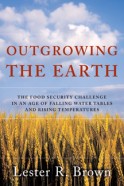It's not really necessary, you know. We don't actually have to have 2.5 million Canadians be food insecure each day. We don't actually have to have a billion or more food insecure persons in the world. We don't actually have to have Mike Davis' Planet of Slums. These are choices we've made or allowed to be made.
In the book of his Massey Lectures, A Short History of Progress, historian Ronald Wright spends a fair bit of time looking at the birth of pastoralism and agriculture and at the perfection of hunting. About hunting, he writes:
By 15,000 years ago at the very latest—long before the ice withdraws—humankind is established on every continent except Antarctica. Like the worldwide expansion of Europe, this prehistoric wave of discovery and migration had profound ecological consequences. Soon after man shows up in new lands, the big game starts to go missing. Mammoths and woolly rhinos retreat north, then vanish from Europe and Asia. A giant wombat, other marsupials, and a tortoise as big as a Volkswagen disappear from Australia. Camels, Mammoth, giant bison, giant sloth, and the horse die out across the Americas. A bad smell of extinction follows Homo sapiens around the world.Not all experts agree that our ancestors were solely to blame. Our defenders point out that we hunted in Africa, Asia, and Europe for a million years or more without killing everything off; that many of these extinctions coincide with climatic upheavals; that the end of the ice age may have come so swiftly that big animals couldn't adapt or migrate. These are good objections, and it would be unwise to rule them out entirely. Yet the evidence against our ancestors is, I think, overwhelming. [....] Upper Palaeolithic people were far better equipped and more numerous than their forerunners, and they killed on a much grander scale. Some of their slaughter sites were almost industrial in size: a thousand mammoths at one; more than 100,000 horses at another. [....]

